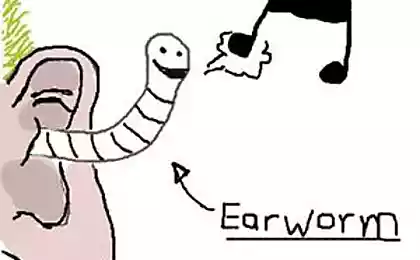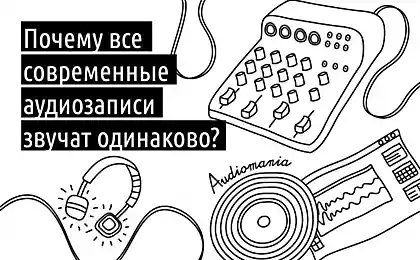1152
Why in the head "stuck" songs

We decided to find out why this happens and how to turn off the player in mind.
"Personally, I could not believe how little information was in terms of the study of this phenomenon," - says Dr. Vicki Williamson, a music psychologist who began to study this question a few years ago. "With me it happened very often».
Dr. Williamson, an expert on memory at Goldsmiths College in London, said that scientists use a variety of terms to describe the problem - constant song syndrome, sticky music, cognitive itch, but more often than "hearing worm" - a phrase that some people misunderstand .
Williamson is working with the program "Breakfast with Sean Kevni" on BBC-Radio, which surveyed his audience with some "auditory worms" they wake up. " In addition, she has collected many stories within the online poll on its website - earwormery.com.
Data showed surprising results. Of the more than 1000 present in the database of songs that match "the jammed 'songs were very few. "This is a very individual phenomenon," says Williamson. But she notes that the coincidence of choice "stubborn" songs become more after, for example, a new film. "Suddenly there are five or six people reporting the song from the new movie, because they just looked at him," says a psychologist.
Williamson has identified a set of criteria, which apparently make these melodies appear in people's minds and stay there.
"The first criterion - that's what people are likely to have recently heard the music," - she says. (This explains why the voice of a friend, singing karaoke, stuck in your head).
It is easy to take the next conclusion is that if you hear the song a few times a day, you are more likely to "get stuck" with it.
But sometimes there are songs in our heads, even when we have not heard them for a long time. In this case, something in our environment may cause the memory of the melody. For example when he saw a sign with the name of the cashier, for example, Jeanne, you can until the end of the day to sing the famous song V. Presnyakov - stewardess named Jeanne.
Another criterion Williamson identified as stress. One of the women in her survey said that song stuck in her head back in the 16 years of age, during the exam, and now pursues it in all stressful situations. There are various theories that can explain why this is happening.
Williamson says that "auditory worms" may be part of a larger phenomenon called "involuntary memory", category, similar to that sudden desire to eat, or to see an old friend, who had not seen. Psychologists believe that the reason why the music brings back memories, it can be "encoded" and connectedness with our personal experiences and emotions.
Other experts believe that music can be "stuck" in the head because of the historical development of the people. Specialist in Neurology music Daniel Levitin of McGill University in Montreal, said that the need zapominatogromnoe amount of information in the absence of writing, for most of human history, led to memorize the basics of survival through songs.
According to Levitin, the main question about "hearing worms", people ask: "How to turn this off?". Scientist gives advice: "Try to sing another song and hope that it" will push the "first».
Dr. Vicki Williamson is currently trying to find the best "treatment».
And Levitin and Williamson agreed that getting rid of the unwanted music - it's a relief. But what if instead of you "infect" "curing" song?























